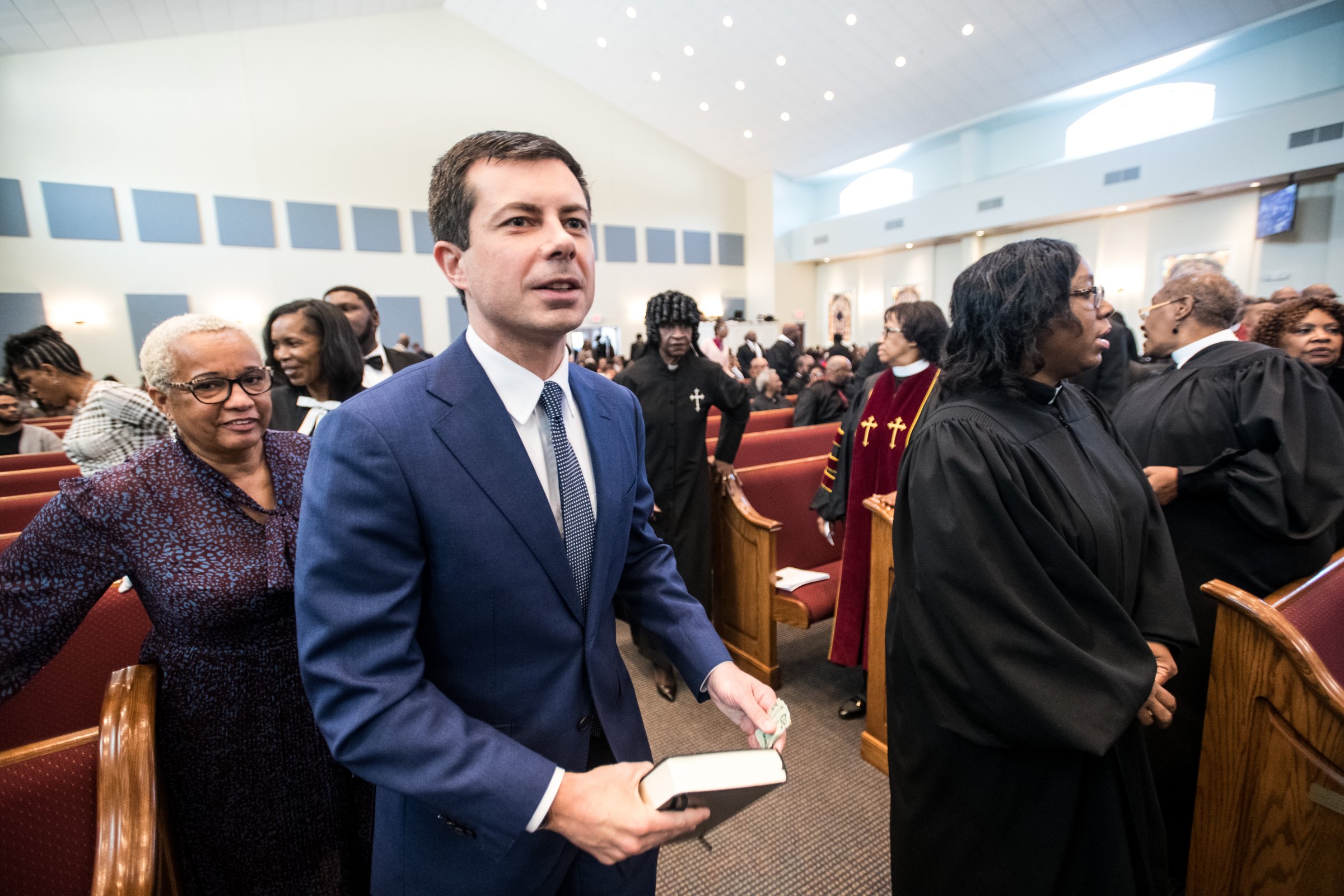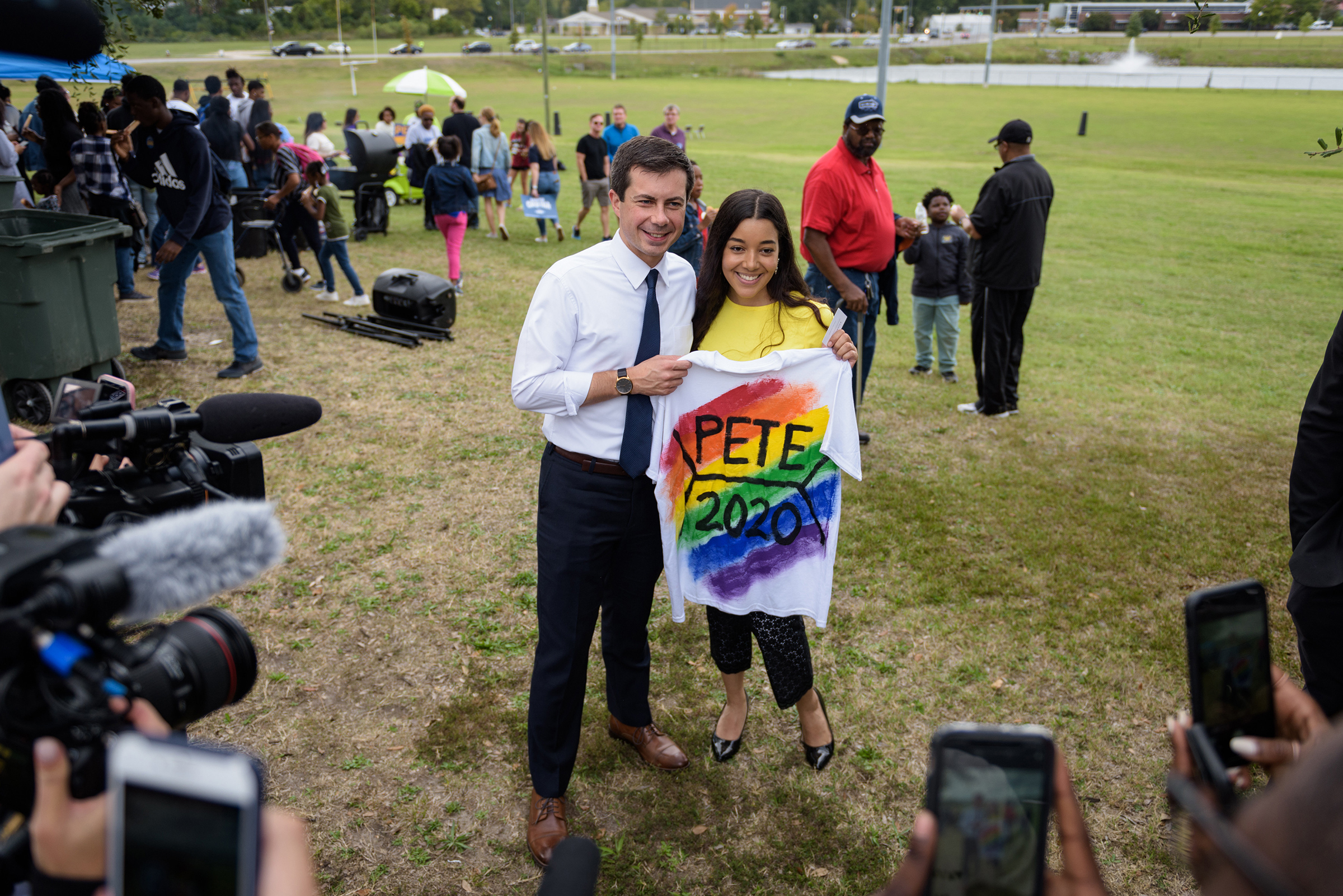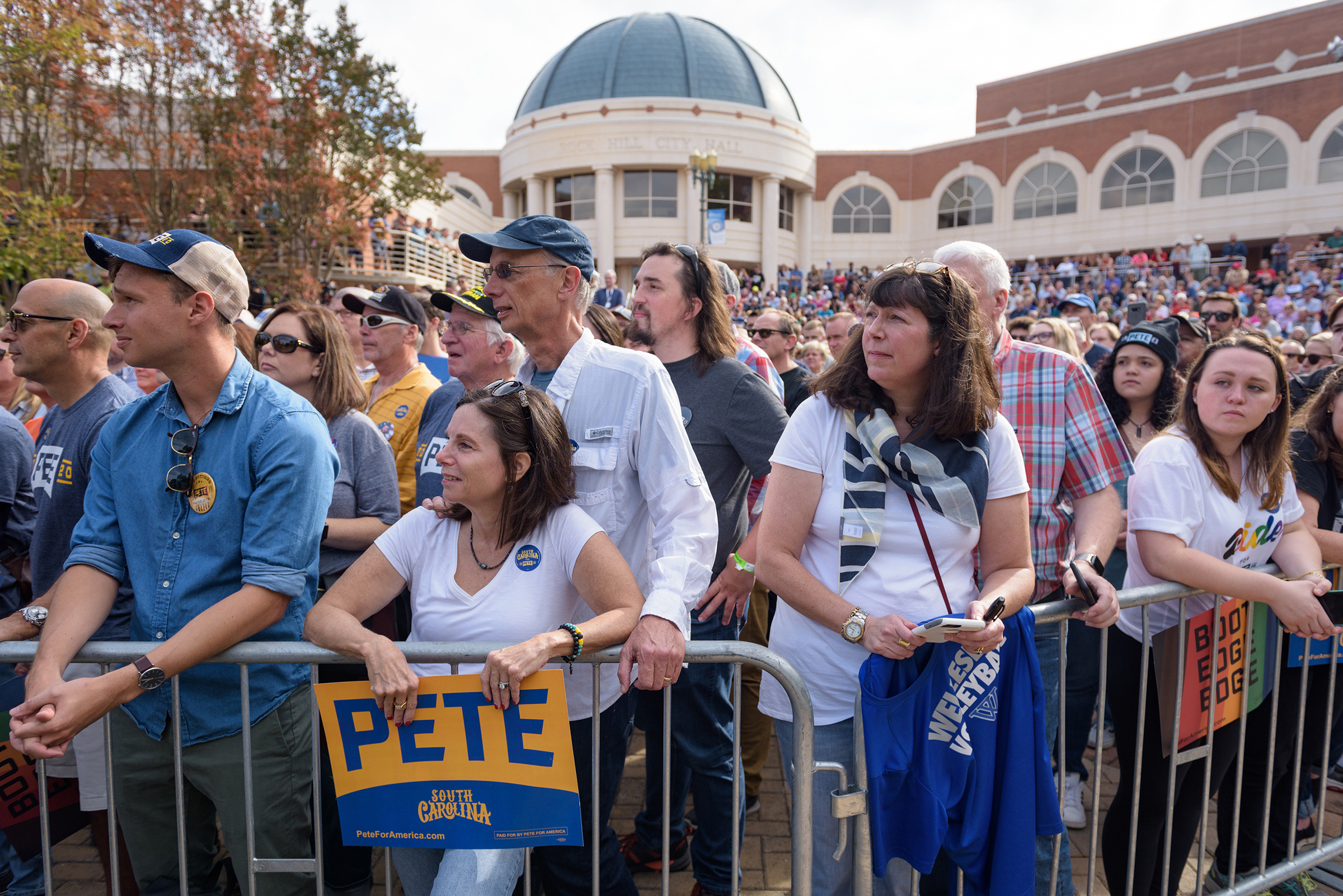
Pete Buttigieg has had a good couple of weeks in Iowa. The latest Quinnipiac poll shows him second only to Sen. Elizabeth Warren, ahead of both Sen. Bernie Sanders and former Vice President Joe Biden, and his speech at Iowa’s famous Liberty & Justice Dinner last Friday was so well-received that it was repackaged as his sixth TV ad in the state. His second, multi-day bus tour across the first-to-caucus state this week has led to more sunny, national coverage.
But Buttigieg needs Iowa more than Iowa needs Buttigieg: The midwestern bastion is his best—and perhaps only—chance of chalking up an all-important win an early primary state. In New Hampshire, Warren and Sanders are at an advantage as fellow New Englanders with deep ties to labor, and in South Carolina, where black voters make up roughly 60% of Democratic primary voters, Buttigieg has so far fallen flat.
“Why should black voters be feeling Mayor Pete? What has Mayor Pete done that would make black voters believe that he is their candidate?,” says Rashad Robinson, president of Color of Change. “[There’s] this expectation that black people, if they don’t support you, there’s something wrong with them, rather than you haven’t earned their vote.” Some black voters in South Carolina describe apathy or skepticism. “We don’t think anybody as divisive as Buttigieg can really win,” says Chelsey Simms, a 38-year old disabled veteran who saw Buttigieg speak at the church in Rock Hill. “His sexuality is polarizing.”
What’s clear is that Buttigieg is doing well in Iowa mostly because Iowa voters are exactly the kind of people who love Pete Buttigieg: aging, mostly white voters with midwestern sensibilities. The South Bend Mayor is about twice as popular with voters over 65 as he is with voters under 30, according to a recent New York Times/Siena poll, and overwhelmingly favored by white voters over voters of color. Many midwestern moderates are also drawn to his brand of hopeful liberalism. “We feel really good about how we’re doing here,” says Ben Halle, his communications director in Iowa, citing Buttigieg’s veteran status and his willingness to talk openly about his faith as reasons for his appeal. “Being a mayor from the midwest has been a really important thing to people.”
But those strengths don’t necessarily translate outside Iowa. Six days before Buttigieg drew the biggest and loudest crowd at Iowa’s Liberty and Justice Dinner, he showed up to a nearly empty campaign tailgate at Allen University, a historically black college in Columbia South Carolina. White volunteers wearing “HBCUs for Pete” T-shirts flipped burgers, but only a handful of people were there to eat them. When Buttigieg finally arrived a half hour after the event started, he greeted the attendees with the strained smile of a boy who’d been stood up at his own bar mitzvah.

Revelers at neighboring tailgates had no idea that presidential candidate Pete Buttigieg was visiting Allen University that day, because they had never heard of presidential candidate Pete Buttigieg. “Honestly, I haven’t given it much thought this year,” Rowena Colon, a 50-year old logistics analyst, told me when I asked about Buttigieg’s event nearby. Tommie Grier, a 41-year old logistics training manager, said he’d heard “nothing at all” about the visit. Any mention of the 37-year old South Bend Mayor running an unexpectedly strong campaign for the presidency elicited blank stares. “We’re just here for the game,” said student Arielle Sutton.
It’s not that black voters in South Carolina necessarily dislike Pete Buttigieg—they just don’t like him. The most typical reaction from the black voters I spoke with during Buttigieg’s most recent swing through South Carolina was resounding indifference: not a sneer, but a shrug. A recent Monmouth poll found that 66% of South Carolina black voters either had no opinion of Buttigieg or had never heard of him; 13% had a negative opinion of him, which was roughly similar to unfavorables for Sens. Kamala Harris and Amy Klobuchar, and former HUD Secretary Julian Castro. With the exception of Joe Biden, no candidate is yet getting the levels of black support they’d need to win the South Carolina primary. But, partly because of his overwhelming whiteness, partly because he’s running against frontrunners with so much better black outreach, and partly because of the police shooting in South Bend that stuck to his campaign early, Buttigieg’s campaign has been tagged with the awkward narrative that he has a problem with black voters. And it shows.
When Buttigieg eventually met with the roughly two dozen people who showed up at his Allen University even, he was game as ever. He said a few words about “breaking bread” and “building community,” greeted volunteers running a snazzy cart offering “Pete pops,” and put his hands on his hips and squinted his eyes as he listened to people share their concerns.
“I thought he was taller,” Patricia Morris, a 75-year old retired educator, said as Buttigieg mingled nearby. But, she added, “his character stands out to me” and “he’s not disrespectful” and “every time I’ve seen him in a debate, I’ve followed him.”
That tracks with the campaign’s line, which is that black voters will warm up to Buttigieg once they see more of him. “We’ve found that the more people get to know Pete, the more they like him,” says Chris Meaghar, the campaign press secretary, adding the the mayor has been prioritizing voter outreach and connecting with community leaders. “It’s not just quality time, but quantity time.”
But Buttigieg’s campaign to woo the black community hit another snag recently when an internal polling memo that suggested that his sexuality was a hurdle for black South Carolina voters leaked to the press. Critics cried foul, alleging that campaign was trying to blame its lack of meaningful black support on homophobia, which contributed to harmful racist stereotypes. The issue puts the campaign in a difficult spot: Buttigieg has lagged behind his rivals in outreach, giving black voters little reason to choose him over other, more familiar candidates.
His failure to address racial justice in South Bend hasn’t helped. Early in his campaign, Buttigieg faced questions about racial inequality in his city, his failure to diversify the police force, and the killing of a black man, Eric Logan, by a white South Bend police officer. Loud criticism from black South Bend residents has contributed to a narrative that he’s failed to prioritize racial justice in his time as mayor. At the same time, religious Christian voters of all races tend to be more skeptical of LGBTQ equality—and while white religious voters now largely identify as Republicans, black religious voters are still mostly Democrats.
Morris is supporting Kamala Harris in the South Carolina primary because “she’s my sorority sister,” but says Buttigieg would be her next choice. (Biden was her “favorite son,” but she declared him too old.) But Morris is perhaps an exception: She changed her own mind about LGBTQ issues after her daughter came out of the closet, but she thought that other South Carolina voters might be more skeptical of a gay candidate. “I wouldn’t hold that against him,” she said. “You love the person for who they are… as long as he doesn’t flaunt it.”

The next morning, when he addressed the AME Zion Regional Conference in Rock Hill, S.C., Buttigieg did not flaunt it. He dove into a truncated version his normal stump speech about the “crisis of belonging” in the United States, citing “this divisiveness among us,” before bringing up the black maternal heath crisis and the disparities in criminal justice outcomes. (Both are issues that he regularly brings up on the trail, even when the audience is largely white.) But the part where he normally mentions his husband Chasten, or alludes to the fact that he owes his marriage to a single vote on the Supreme Court, went unsaid. It was a significant omission for a candidate who famously kissed his husband after his announcement speech.
Instead, the speech included only an oblique reference to his sexuality. “All of us in different ways have been led to question whether we belong. I know what it is to look on the news and see your rights up for debate,” he said. “I also know what it is to find acceptance where you least expected it, and to find compassion where you most needed it.”
Despite the controversy, some voters openly acknowledged that Buttigieg’s sexuality has made it difficult for religious black voters to get on board with the young South Bend mayor. “There’s homophobia, honestly, just in our community,” says Simms, the veteran who showed up to hear Buttigieg speak in Rock Hill. “It’s just a thing that we have more than other communities.”
Some experts resent the implication that black voter apathy towards Buttigieg is related to homophobia. Instead, they say, other candidates have simply done a better job of reaching out. Biden and Sanders have deep name recognition in the black community, Warren has been doing aggressive outreach to black community leaders for years, and Booker and Harris speak about racial justice from place of personal experience. Robinson, the Color of Change president, also explained that black voters, like many in the rest of the Democratic electorate, are deciding who to support in the primary based on who they think is most likely to win against Trump. “Black voters are the most strategic voters there are,” he said. “They are voting based on who they think the white people around them will support.”
That strategic thinking becomes apparent in discussions about Buttigieg’s sexuality. “There are those stereotypes that he’s dealing with: people are going to say, ‘You’re gay, you’re naturally weak,'” says Simms. “When he comes with the mudslinging, are you going to be able to stand against that? Are you going to be able to seem presidential and not allow it to stick to you and maintain your deportment? Or are you going to weenie your way out of it? That’s our fear, because we have such little knowledge of the LGBT community.”
Simms says Buttigieg reminds him of Jimmy Carter, who famously lost the presidency to Ronald Reagan in 1980. “It’s that vibe, it’s that wussified, humble, nice guy finish last, nobody’s gonna date him, it’s that vibe,” he said. Going up against Trump, Simms says, many voters are thinking that Buttigieg doesn’t “have the testicular fortitude to stand against him.”
That’s the kind of talk that would make Buttigieg’s older, white supporters back in Iowa blush. Which is perhaps the problem. Buttigieg has built an army of supporters in Iowa being a midwestern nice guy; now he’s got to convince the rest of the country that he’ll fight for them, too.
More Must-Reads from TIME
- Why Trump’s Message Worked on Latino Men
- What Trump’s Win Could Mean for Housing
- The 100 Must-Read Books of 2024
- Sleep Doctors Share the 1 Tip That’s Changed Their Lives
- Column: Let’s Bring Back Romance
- What It’s Like to Have Long COVID As a Kid
- FX’s Say Nothing Is the Must-Watch Political Thriller of 2024
- Merle Bombardieri Is Helping People Make the Baby Decision
Write to Charlotte Alter / Rock Hill, S.C. at charlotte.alter@time.com